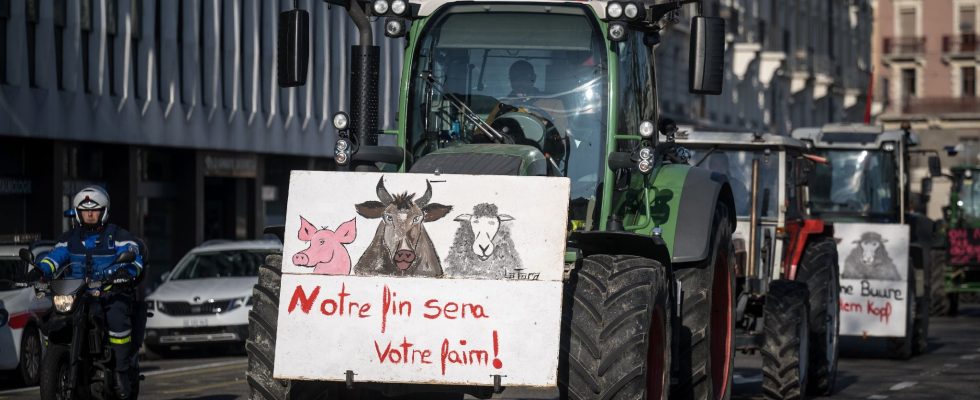In the four corners of Europe, the mobilization of the agricultural world continues. From Italy to Romania, via Switzerland and Spain, farmers increased the number of blockades and other striking actions this Saturday, February 3. On the other hand, the movement ran out of steam in France and Romania, where demonstrators lifted the roadblocks following measures announced by the governments of the two countries.
To try to extinguish the anger which was gaining ground on the continent, the European Commission promised, Thursday February 1, measures to defend the “legitimate interests” of EU farmers, in particular by reducing the “administrative burden” of the much-maligned Common Agricultural Policy (CAP).
In Italy, farmers converge on the capital
Without convincing Italian farmers. This Saturday, February 3, some 150 tractors demonstrated in Orte, an hour from the capital, along a major highway. Next stop: Rome.
In recent weeks, protests have erupted from Sicily to the north of the country. Convoys of tractors blocking roads are now regularly reported, although the scale of the movement has not reached the level of farmers’ protests in France, Germany or Belgium. “The farmers’ protest targets Brussels’ agricultural policies and the choices of governments, details the Milanese daily Corriere della Sera. It targets in particular the authorization of cultivated meat [qui n’est en réalité pas d’actualité]insect meal, diesel prices too high, and the measure of the new CAP which provides, in practice, an obligation for annual crop rotation.”
Italian farmers have been demanding an audience with the government of ultraconservative Prime Minister Giorgia Meloni for days, without having received a response so far.
In Germany, demonstrators block Frankfurt airport
In Germany, several hundred farmers on tractors, opposed to a plan to reduce subsidies for diesel decided by the government of Olaf Scholz, disrupted access to Frankfurt airport this Saturday – the most important from the country.
By midday, the police estimated that 400 tractors were taking part in the demonstration, while the Hessian state farmers’ association counted up to a thousand. The demonstration ended early in the afternoon, according to local police. This rally follows the blockade of numerous ports in the country, including that of Hamburg, on Monday January 29.
First event in Switzerland
In Switzerland, farmers’ anger started later. The country experienced its first demonstration this Saturday, with a procession of around thirty tractors parading through the streets of Geneva to express the “revolt” and the demands of Swiss farmers.
“In Switzerland, many people say that the situation is different and that we are not subject to (EU) policies. But in reality, we are still in the same kind of framework,” declared Eline Müller, union secretary of Uniterre at the origin of the rally.
Among their demands, better consideration of agriculture but also an increase in country prices to producers of 5 to 10%. “Currently, the median salary of a farmer is 17 francs per hour. The entire sector must make an effort,” insists Francis Egger, vice-director of the Swiss Farmers’ Union, in the columns of the Time.
Spanish farmers mobilize their troops
In Spain, the three main agricultural unions announced on Friday February 2 that they were continuing their mobilization following a meeting with the Minister of Agriculture. A series of demonstrations are planned in the coming weeks in the country, including February 13 in Barcelona.
These unions, which denounce “a growing frustration and unease” in the agricultural sector due in particular to “the stifling bureaucracy generated by European regulations”, joined the European movement of revolt on Tuesday January 30. Europe’s leading producer of fruits and vegetables, Spain has been hit by an intense and prolonged drought for several years.
Continued blockades in the Netherlands and Belgium
In the Netherlands, farmers carried out several protest actions on highways, briefly blocking an axis north of Amsterdam on Friday February 2. The highway on the Belgian-Dutch border, occupied on the Belgian side during the day by tractors, was freed in the afternoon.
On the other side of the border, in Belgium, although most of the blockades were lifted on February 2, including that of the port of Zeebrugge, several supermarket chain distribution centers were blocked the next day.
In France and Romania, the movement is running out of steam
French farmers voluntarily lifted most of their roadblocks on Friday, the day after announcements made by the government. The promised aid should amount to around 400 million euros and notably include the “pausing” of a pesticide reduction plan.
This Saturday, the police cleared the last two blockades of the Confédération Paysanne, a minority union. Smaller actions were organized immediately, such as the dumping of manure in front of two hypermarkets in Indre-et-Loire (center), where farmers “checked” products to verify origin and labeling.
As for the Romanian demonstrators – who were among the first in Europe to shout their “fed up” by blocking roads – they began to break camp this Saturday, February 3.
The demonstrators are “satisfied” to have obtained a place at the negotiating table with the government, said one of their representatives, Danut Andrus. They will thus participate in the newly created interministerial commission, this Monday, February 5, following a final round of negotiations.
Furthermore, the Romanian government had already adopted several of the 76 requests put forward to satisfy professionals in the sector, including subsidies for diesel, state aid and the possibility in certain cases of postponing loan repayments.
